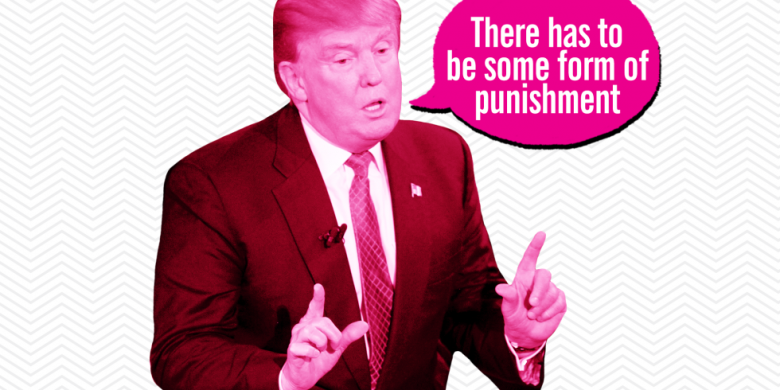The Pro-Life Movement's Disingenuous Response to Trump's Controversial Abortion Remarks
Քաղաքական
This week, Donald Trump argued that if abortion should ever be outlawed, and a woman chooses to terminate a pregnancy, she should be punished. He declined to specify what the punishment should be but insisted that "some form" of punishment should occur. When his comments drew the ire of advocates on both the right and the left, Trump (as usual) backtracked and claimed that doctors who offer abortions should be punished.
For abortion rights advocates, Trump's position is downright scary. Not only does such thinking support a universe in which women have no choice about whether to become parents, and thus no control over their own bodies, but it also supports criminalizing women who insist on the right to bodily autonomy around matters of pregnancy.
However, the outrage from pro-life advocates seems both weird and disingenuous. Many pro-life advocacy groups claimed that it was preposterous to suggest that they would want women to be put in jail for having abortions. The problem is that in our current system of justice, jail is a very typical penalty for those who break the law. Should abortions ever become outlawed, there is no reason to believe that pro-life advocates, who suggest that abortion is murder, would not push for the highest forms of legal punishment available within the law. Moreover, if doctors who administer safe and medically accepted health-care procedures to patients who need them become criminalized, then we also unduly put the sacred relationship between patients and medical care providers in jeopardy. And we would participate in harming people like Dr. Willie Parker and the poor women he services, as one of two abortion providers in the state of Mississippi.
Those of us, like me, who believe unequivocally that all people (including women and gender-non-conforming people) who can birth children should be able to terminate pregnancies, find this imaginary return to a pre-Roe v. Wade world, to be wholly nightmarish. And there is good cause for alarm. In early March, the Supreme Court heard oral arguments in a case called Whole Woman's Health v. Hellerstedt. This case challenges the sweeping restrictions placed on abortion clinics in Texas in a 2013 law called House Bill 2, which demanded, among other things, that abortion clinics meet the building standards of ambulatory care clinics. These restrictions caused massive closures of abortion clinics in Texas, resulting in women frequently having to travel more than 80 miles one way to an abortion site, or even to take drastic measures and travel out of state for abortions in the rare cases where poor women could access enough money to do so.
If the Supreme Court upholds House Bill 2, it would be upholding the most significant restrictions on abortion rights since the 1973 Roe v. Wade decision. And such a choice would open the door for other states to pass similar bills.
So we simply should not believe pro-life advocates who claim that they don't want people who terminate pregnancies to go to jail. All over the country, pro-life organizations have supported the passage and enforcement of "fetal rights" laws. These laws allow states to place drug-addicted pregnant women in jail, rather than insisting on and providing appropriate medical care. In one particularly troubling case, Alicia Beltran, a pregnant woman from Wisconsin, was imprisoned after admitting to doctors that she had previously suffered from drug addiction. Though she tested clean and had been for many months leading up to her pregnancy, doctors insisted that she take an anti-addiction drug. When she refused, she was placed in jail, in order to "protect" her fetus, as if a jail environment is a healthy place for a woman and her child.
The pro-life right, has, therefore, already created the legal scaffolding to place women in jail, if abortion ever becomes outlawed. And now with the death of Justice Antonin Scalia and the GOP stonewalling the confirmation hearings of Judge Merrick Garland, there is a possibility that the Supreme Court could split 4–4 on this issue, a devastating decision that would uphold Texas's current abortion restrictions. The only hope that we don't get closer to a Donald Trump universe on abortion rides on the decision of Justice Anthony Kennedy, a swing vote on the court, who sometimes leans right and sometimes leans left. Kennedy has voted to uphold the right to abortion, but has also suggested that states have a compelling interest in protecting the lives of women and children.
It is unclear what his decision will be, but whatever he decides will be critical to the landscape of reproductive justice for years to come. A split Supreme Court decision would clear the path for a full-frontal Republican attack on reproductive rights. And the biggest victims of such an attack would be poor women, who are disproportionately women of color.
In some ways, Donald Trump's fickle position and posturing on abortion, which has changed in the last decade from a clear defense of choice to his current calls for punishment of women, diverts our attention from what's at stake. The real conversation needs to be about how we protect the right to abortion for all people who need it. Trump's say-anything-to-get-elected antics should not distract us from the very concrete ways that the GOP is playing chess rather than checkers in their decades-long quest to control women's bodies and force people into having children that they would otherwise choose not to have.
The 2016 election has real political consequences for the material lives of women, and it is incredibly important that we reject every kind of attempt by Republicans to criminalize women for insisting, "my body, my choice."
































































